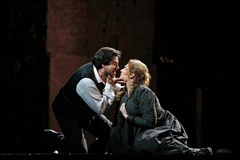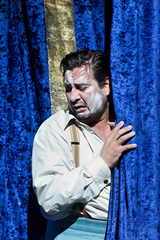| Opera Reviews | 27 April 2024 |
HD gives a different perspective to Met productionsby Steve Cohen |
|
| Mascagni: Cavalleria rusticana Leoncavallo: Pagliacci Metropolitan Opera (HD simulcast) May 2015 |
|
|
The new production of Cav was derided by critics but it came off effectively on the big screen, while the better-reviewed staging of Pag showed its warts. David McVicar’s concept for Cav was unrelentingly dark, with a hundred chairs occupying the stage, distracting attention from the principals. The HD cameras focused on the protagonists and therefore we didn’t notice those chairs and the blackness so much. What emerged was a more human drama than what was seen in the opera house. On the other hand, Pag appeared to be hammy and relentlessly hyper-kinetic. Keep in mind that both were written in the early 1890s and depicted real people of the time with verity (truth) — hence coining the term verismo. The production of Cav keeps that premise although it changes particulars such as turning the Easter morning scene into night. McVicar’s Pag, however, departs radically from the composer/librettist’s intentions. Both operas tell of adulterous affairs that end in murder. In Cavalleria the tenor Turiddu dumps his girlfriend Santuzza and has an affair with a married woman. Critic Eric Simpson derided that first half of the double-bill in Classical Review: “To call this Cavalleria a disaster would be inaccurate, as that word suggests far more action than could be seen on the Met’s stage.” Yet I saw it as a moody glimpse of primitive emotions. Santuzza, having been abandoned by Turiddu, was shown almost constantly at the edge of the stage, apart from all others, indicating how she was shunned and placed outside the community. Eva-Maria Westbroek was miscast in that role. She appeared not at all Italianate and her voice wobbled with wide vibrato when she sang at full volume. Marcelo Álvarez did a fine job as Turridu, his best work in his 17 years as a Met tenor. His swaggering Army vet descended touchingly to a pathetic man who bade farewell to his mother before going to certain death in a duel with his lover’s husband Alfio. George Gagnidze was properly robust and menacing as Alfio, with his powerful and unsubtle voice.
The clowning was a campy exaggeration of poorly-done vaudeville. Its humor was intentionally silly, with a chicken puppet and shaving cream sprayed all over everything. The broad style and facial grimacing used in the 3800-seat Met opera house does not play well on a big screen, nor will it when the production is shown on TV later this year. It also seemed weird that McVicar staged the prologue (quite apart from the play-within-a-play) with Gagnidze appearing as if he came from a sleazy burlesque house rather than a troupe of roving players. Gagnidze was strong, while Álvarez sang Canio appealingly although lacking the ringing voice of past giants such as Giovanni Martinelli or Mario Del Monaco. It’s not Álvarez’s fault that he was directed to play Canio as a buffoonish drunk who was not nearly as sympathetic as the character should be. In this tawdry concept, Patricia Racette played Nedda as a slut. The Met orchestra under Fabio Luisi was silky smooth and nuanced, while the choruses led by Donald Palumbo were magnificent.
|
|
| Text ©
Steve Cohen Photos © Cory Weaver / Metropolitan Opera |

 Television’s close-up lenses gave to the poor and took from the rich during the HD cinema telecast of Cavalleria Rusticana and Pagliacci.
Television’s close-up lenses gave to the poor and took from the rich during the HD cinema telecast of Cavalleria Rusticana and Pagliacci. As for the Pag, its period was moved to the late 1940s with electric lights and an on-stage truck, and vaudeville performers instead of commedia dell-arte. Therefore it is no longer of the original time nor is it of ours. Instead, this Pag exists in a distant world that does not relate to us. What’s more, the vaudeville is brash and crude instead of the decorous and formal commedia dell-arte, so we lost the shocking contrast when the play-within-a-play turns into a real life drama.
As for the Pag, its period was moved to the late 1940s with electric lights and an on-stage truck, and vaudeville performers instead of commedia dell-arte. Therefore it is no longer of the original time nor is it of ours. Instead, this Pag exists in a distant world that does not relate to us. What’s more, the vaudeville is brash and crude instead of the decorous and formal commedia dell-arte, so we lost the shocking contrast when the play-within-a-play turns into a real life drama. 





